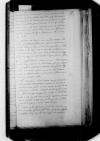List #5742
Alfonso de VALDÉS do Ioannes DANTISCUSs.l., [1527-08-31 — 1527-09-08]
Regest polski: Valdes pyta Dantyszka, czy ma mu zapewnić nocleg w bardzo przyjemnej miejscowości Covillas de Zerrata, położonej na uboczu, 4 mile od Palencji i 5 mil od miejsca pobytu Valdesa. Przydzielono tam kwaterę podkanclerzemu [Baltazarowi Merklinowi von Waldkirch]. Valdes przypuszcza, że wyjedzie następnego dnia po obiedzie, prosi więc o szybką odpowiedź.
Rękopiśmienne podstawy źródłowe:
Pomocnicze podstawy źródłowe:
Publikacje:
| ||||||||||||||||||||
Tekst + aparat krytyczny + komentarz Zwykły tekst Tekst + komentarz Tekst + aparat krytyczny Ekscerpty dotyczące podróży Dantyszka
Salutem plurimam.
Habuimus a caesare villam nomine Covillas de Zerrata pro domino vicecancellario ac imperiali cancellario. Situs loci nimium placet, est enim remota ab itinere, distans quattuor leucas a Palentia et quinque ab hoc oppido, praeterea audio locum esse amoenissimum. Si placeret Dominationi Vestrae illuc venire, curabo pro parte mea, ut habeat hospitium ac omnia alia ex sententia. Arbitror nos cras discessuros a prandio, quare Dominatio Vestra significet mentem suam desuper.
Eiusdem Dominationis Vestrae servitor Valdesius
